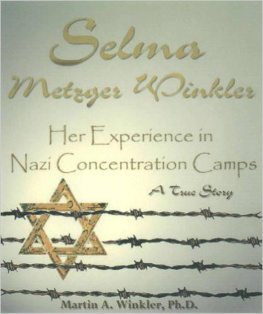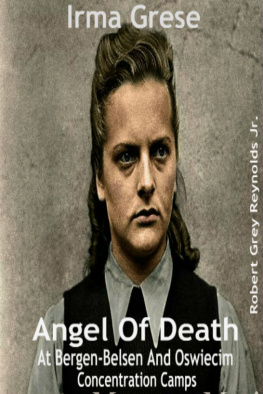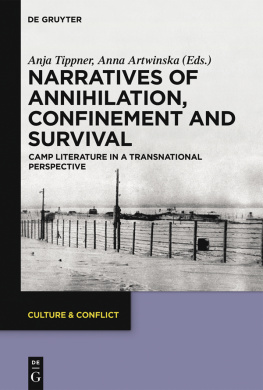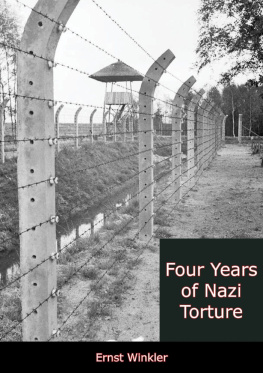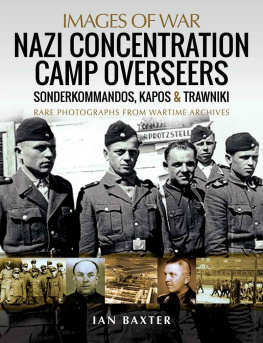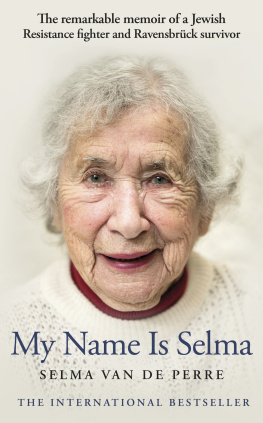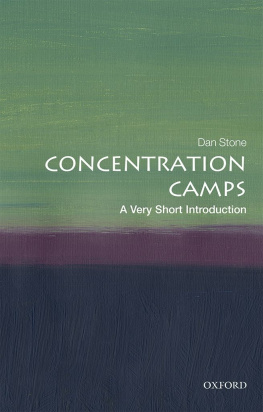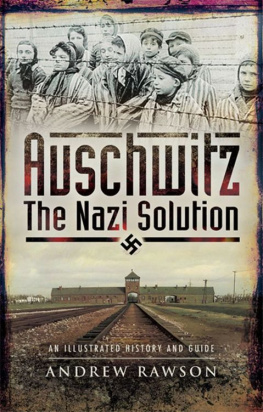This book was originally privately published in 1984 by Janet and Martin Winkler of Memphis, Tennessee, and Mr. and Mrs. Edward Winkler of Fort Stockton, Texas. Publication honors the ninetieth birthday of Selma Metzger Winkler.
C opyright 1981 by Martin A. Winkler.
Preface
The following account was lovingly compiled by Martin Winkler, grandson of Selma Metzger Winkler, during many conversations with his grandmother. He has worked untiringly to set down the facts and circumstances of her story as correctly as possible, so that future generations will be made aware of the suffering and degradation endured by millions of peoplepeople like Selma and her familycaught in the madness of Hitler's Nazi Germany. "Lest we forget!"
About the Book
The Holocaust in Europe 1939-1945 completely wiped out thousands of Jewish families, or in even more cases, it left a few members of families which were once numerous. Selma Metzger's family was in the second category. She came from a closely knit, warm, middle-class German Jewish family comprised of about 70 people. Only she, her two daughters, and seven others survived at the end of the war. Her cousin Siegmund Spiegel and his wife and daughter were hidden by a German farmer for over three years.
Siegmund lived in Germany after the war and died in Ahlen, Westfalen in 1982. His daughter Karen married an American soldier and now lives in New York City with her husband and two children. Frieda Spiegel, another cousin, immigrated to England and then to the United States. She now lives in San Francisco, and she and Selma often visit. Two other cousins, Fine Spiegel and Hilde Spiegel Geller, who formerly lived in Ahlen, now live in New York City.
Selma Metzger Winkler was born on September 2, 1894 in Ahlen, Westfalen, Germany. Her father was Hertz Nathaniel Spiegel, a cattle merchant. Her mother was Johanna Dannenbaum Spiegel. She had an older brother Norbert, and two younger sisters, Martha and Sarah. Norbert was a prodigy who spoke four languages fluently, and had mastered the classics at an early age.
Selma was married to Morris Metzger on December 30, 1919. They had two daughters: Laura, born on December 13, 1920, and Eva, born on January 28, 1926. Both girls were born in Dusseldorf, where the family lived until they moved back to the little town of Rheine in Westfalen.
The account of Selma's years in Nazi Germany begins when they were living in Rheine at the beginning of Hitler's regime. The story ends with the liberation of Selma's concentration camp by the Russian Army.
After liberation, Selma and Eva were hospitalized by the Russian Army. Eva required many weeks under a doctor's care to recover from typhus fever. They were then resettled in Rheine. Selma immigrated to the United States to join Laura, who had left Germany before the war. Selma first spent several months in a UN refugee camp in Bremen, Germany. Eva had to wait a year before joining Selma and Laura, due to the United States immigration laws. Laura and Eva were both working in Fort Worth in 1951, when Ann Rolnick introduced Selma to Nathan Winkler, a merchant from Fort Stockton, Texas. Nathan was a 68 year-old widower and he had always acted quickly and decisively when faced with golden opportunities; he proposed marriage after a short courtship. They were married on January 25, 1951 in Fort Worth. They settled in Fort Stockton, where Nathan continued working in the department store he had founded more than 40 years before.
I was fortunate to have Selma as a step-grandmother, and doubly fortunate to have had her living only two blocks away for most of my youth. She baby-sat for my parents when my sister and I were children. It was Selma who patiently extracted cactus spines from me after my first encounter with a west Texas succulent. Selma gave me my first lessons in Hebrew, and she later taught me German. When I was a teen- ager, Selma provided snacks or entertaining stories at all but the most unreasonable hours.
Selma's acquaintances in Fort Stockton knew her as a sweet-tempered, energetic woman. Her openness and lack of bitterness made it impossible for anyone to guess that she had spent more than four years in Nazi concentration camps. For 28 years, until Nathan died at age 94, Selma was a devoted and caring wife. She often worked at his side in Winkler's Department Store until he retired at the age of 88. At home Selma was seldom idle: when not cooking, gardening, or cleaning, she spent long hours needle-pointing or crocheting.
She has produced hundreds of beautiful wall hangings, comforters, and Afghans, which she has generously given to family and friends. Though she came to the United States when she was 54 years old, and knowing nothing of the American language. she rapidly became fluent in English. She is also an avid reader in Englisheverything from Tolstoy to The Reader's Digest. Selma was a guest speaker for the Fort Stockton Lions and Jaycees, and she recounted her experiences in Nazi Germany. Because of her compassion and keen judgment, Selma is one of the best people in my family to consult when words of wisdom or advice are needed during difficult times.
The horrors that they experienced have clearly not bent the remarkable spirits of Selma and her daughters. Since Nathan died in 1977, Selma lived with Laura and Sylvan Feder in San Fransisco. Laura and Sylvan have a daughter, Miriam, who is assistant attorney general for the state of Oregon. Though they were deprived of secondary and college educations by the Nazis, Laura and Eva have both completed their college educations despite the exigencies of jobs and family. Laura attended the College of San Mateo, and she received an Associate Arts degree in 1979. In addition to working as an airline stewardess, Eva has worked as a claims adjustor, and then for many years she was a safety director for the city of San Fransisco. Since 1979, she sold real estate, and at the same time enrolled in the City College of San Francisco in the evening division. Since 1982 she took academic courses as a full-time student, and, at the age of 58, she received an Associate Arts Degree. She was the Valedictorian of her class with a 3.91 grade- point average. She then attended The University of California at Berkeley and graduated with a degree in history. Eva is an outstanding vocalist and musician, and she has entertained many groups throughout the San Fransisco Bay area with Yiddish as well as popular folk songs. Eva is the author of an article "The Lullaby in Yiddish Folk Song" published in the scholarly quarterly, Jewish Social Studies.
Since she began living with Laura and Sylvan, Selma has been active in the nearby senior citizen center.
She attends weekly meetings and teaches arts, crafts, and needle-work. She has had several exhibits of needle-point pictures and Afghans. She has worked with leather, pottery, 'Zipper-art", knitting, and crocheting. This book is dedicated to the memory of those in Selma's family who perished in Europe from 1939 to 1945.
S elma Metzger, her husband, and her daughter Eva were picked up by the Gestapo on December 11, 1941, and deported by train from Rheine, Germany to Riga, Latvia. Since Hitler had gained power they had been persecuted and gradually stripped of their civil rights. First they were required to wear a Star of David on their dresses or coats. They were not allowed to walk on the sidewalk, nor could they speak with other citizens in public. Their ration of food was smaller than that of other citizens, and they were not allowed fresh fruit or vegetables. They could only shop in stores between one and two PM. on Mondays.
Next page
